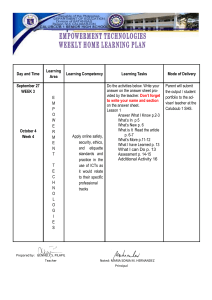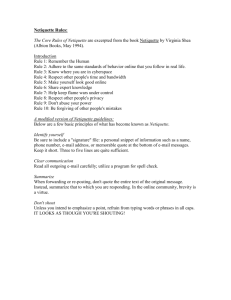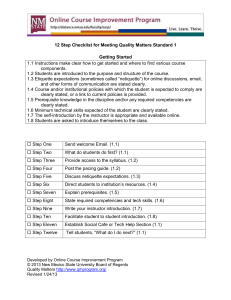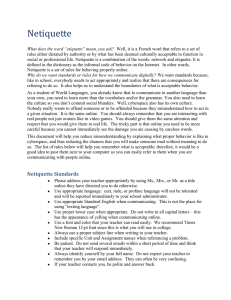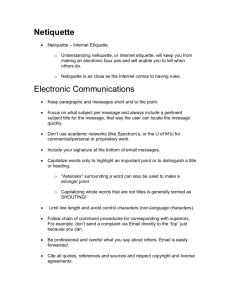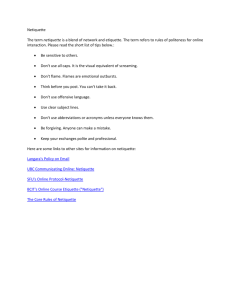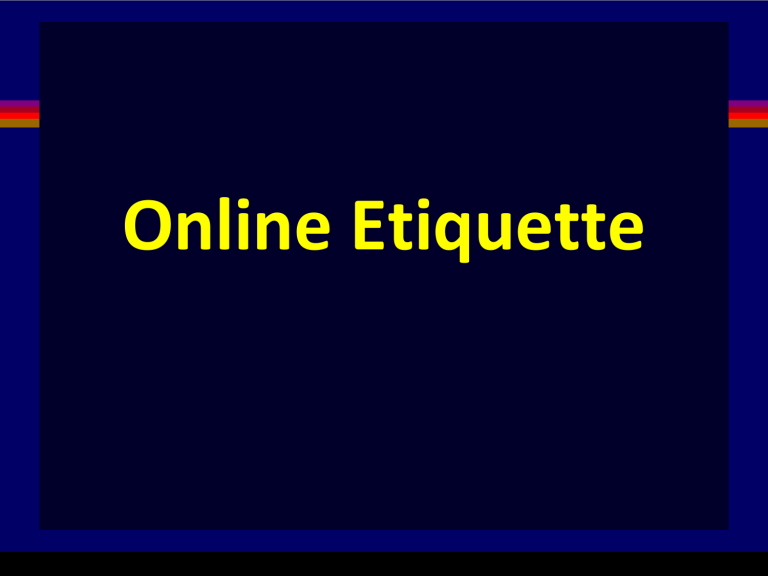
Online Etiquette 1. Security. Remember that your password is the only thing protecting you from pranks or more serious harm. Do not share your password with anyone. Change your password if you think someone else might know it. Always log out when you are finished using the system. 2. Participate. Contribute and get involved in the conversations. Your insightful commentary in the online discussions is considered part of the requirement for passing the course. 3. Be respectful. Physical absence does not mean that you are not dealing with real people. Be always mindful of the words you use in writing or in speaking and the feelings of the others. It is essential to keep in mind the feelings and opinions of others. We all have differing ideas on certain matters. If you wouldn’t say it to someone’s face, don’t say it online either. 4. Be aware of strong language. The use of all caps and exclamation points convey strong messages. All caps mean that you are shouting. Multiple use of exclamation points means that you are angry and insisting on something. Identify the potential of confusions before sending messages. It is better to read everything out loud before you send it. 5. Be careful with humor and sarcasm. Make it clear you are being funny and not being rude when you do. Use emoticons and smileys correctly during chat time. However, remember not to use these emoticons on academic papers (quizzes and exams). 6. Grammar and spelling matter. Online classes are part of your formation. Keep everything formal. Your written communication should be professional and reflect the proper writing style. 7. Submit files the right way. Follow the ground rules for file assignment submissions, like naming conventions that help them keep things organized or acceptable file formats. If you don’t follow instructions, you’re taking the risk that your instructor won’t be able to find or open your assignment. Save yourself and your instructor a headache and read their instructions carefully before submitting. 8. Cite your sources. Infuse your own ideas. Whenever you are sharing an idea that originated from someone else (even if it is not word for word), it is good practice to cite that source. However, on essays and quizzes it is best that you use your own ideas and not others. If you submit a copied material online without infusing your own ideas it will be scored ZERO. 9. Attempt to find your own answer. No Copying. If you’re confused or stuck on an assignment, take the time to try to figure it out on your own. If you are struggling composing sentences, just keep on going. Grammar and style can be forgiven but never plagiarism. It is always best to be original. Original ideas will receive high scores. 10. Select what you post on social networks. Keep your discussions with your teacher and classmates’ private. 11. Dress code. Whenever the class decides on a zoom/google classroom/live feed discussion. No sleeveless shirts. No vulgar prints on the upper shirt. No walking around on undies and boxers. 12. Notices and confirmations. If you receive communications be sure to confirm. If you are on a situation, be sure to inform. There are valid and invalid excuses. Education does not need excuses. Find ways. Citation and reference: Albion, (2015). The Core Rules of Netiquette — Excerpted from Netiquette by Virginia Shea — Albion.com. Retrieved 15 June 2020, from http://www.albion.com/netiquette/corerules.html Brooks, Ashley (2019). 10 Netiquette Guidelines Online Students Need to Know. Retrieved 15 June 2020, from https://www.rasmussen.edu/student-experience/college-life/netiquetteguidelines-every-online-student-needs-to-know/ Common Sense Media, (2015). 7 Rules to Teach Kids Online Etiquette. Retrieved 15 June 2020, from https://www.commonsensemedia.org/blog/7-rules-to-teach-kids-online-etiquette Connor, P., (2015). Netiquette: Ground Rules for Online Discussions. Retrieved 15 June 2020, from http://teaching.colostate.edu/tips/tip.cfm?tipid=128 Madison College, (2015). Online Etiquette Guide | Madison Area Technical College. Retrieved 15 June 2020, from http://madisoncollege.edu/online-etiquette-guide Matthews, Tammy (2015). 5 Discussion Ground Rules for the Online Classroom. Retrieved 15 June 2020 from http://blog.online.colostate.edu/blog/online-teaching/5-discussion-groundrules-for-the-online-classroom/ Netiquette Guide for Online Courses (N.D.). Retrieved 15 June 2020, from http://teach.ufl.edu/wp-content/uploads/2012/08/NetiquetteGuideforOnlineCourses.pdf Rinaldi, A. (2015). The Net: User Guidelines and Netiquette, by Arlene Rinaldi. Retrieved 15 June 2020, from http://courses.cs.vt.edu/~cs3604/lib/Netiquette/Rinaldi/
